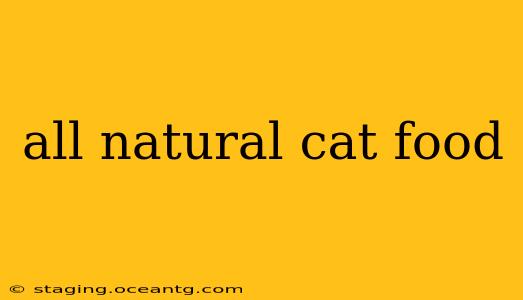Choosing the right food for your feline companion is a crucial aspect of responsible pet ownership. With a plethora of options available, understanding what constitutes "all-natural" cat food and its implications for your cat's health is vital. This comprehensive guide delves into the world of all-natural cat food, addressing common questions and providing insights to help you make informed decisions.
What Does "All-Natural" Really Mean in Cat Food?
The term "all-natural" isn't strictly regulated in the pet food industry. Unlike human food, there isn't a universally accepted definition. Therefore, "all-natural" can vary significantly between brands. Generally, it suggests the food contains ingredients that are minimally processed and free from artificial colors, flavors, and preservatives. However, it doesn't necessarily mean the food is completely free of additives or that the sourcing of ingredients is entirely ethical or sustainable. Look for brands that are transparent about their sourcing and manufacturing processes.
What are the Key Ingredients to Look for in All-Natural Cat Food?
High-quality all-natural cat food prioritizes whole, recognizable ingredients. Look for formulas featuring:
- Named meat sources: Instead of vague terms like "meat by-products," opt for foods specifying "chicken," "salmon," or "turkey" as the primary protein source.
- Whole grains (in moderation): Some all-natural options include whole grains like brown rice or oats for added fiber and nutrients. However, cats are obligate carnivores, so protein should always be the dominant component.
- Fruits and vegetables: Small amounts of fruits and vegetables can provide additional vitamins and antioxidants, but these should be supplementary, not primary, ingredients.
- Healthy fats: Sources like fish oil or flaxseed oil provide essential fatty acids for healthy skin and coat.
How Can I Tell if a Cat Food is Truly All-Natural?
Scrutinizing the ingredient list is key. Look for:
- Short and understandable ingredient lists: Avoid foods with lengthy lists containing numerous unidentifiable additives.
- Clearly identified meat sources: As mentioned earlier, specific meat names are a good sign.
- Absence of artificial colors, flavors, and preservatives: These are often unnecessary additions.
- Transparency from the brand: Reputable brands readily provide information about their sourcing and manufacturing practices on their websites or packaging.
Are there Different Types of All-Natural Cat Food?
Yes, all-natural cat food comes in various forms, including:
- Dry kibble: A convenient and cost-effective option, but ensure it's made with high-quality ingredients.
- Wet food: Often higher in moisture content, which can be beneficial for cats' hydration.
- Raw food: Requires careful preparation and handling to avoid bacterial contamination. Consult your veterinarian before introducing raw food to your cat's diet.
What are the Benefits of Feeding My Cat All-Natural Food?
Feeding your cat all-natural food can offer several potential benefits:
- Improved digestion: Whole, easily digestible ingredients can promote better bowel movements.
- Healthier skin and coat: Essential fatty acids from natural sources contribute to a shiny, healthy coat.
- Increased energy levels: High-quality protein supports overall vitality.
- Reduced risk of allergies: Minimizing artificial ingredients can reduce the chances of allergic reactions.
Is All-Natural Cat Food More Expensive?
Generally, yes, all-natural cat food tends to be more expensive than conventional options. This is due to the higher cost of sourcing and processing high-quality, natural ingredients. However, the potential long-term health benefits may outweigh the increased cost.
How Do I Transition My Cat to All-Natural Food?
Gradually introduce the new food over 7-10 days to avoid digestive upset. Start by mixing a small amount of the new food with their current food and gradually increase the proportion of the new food over time. Monitor your cat for any changes in appetite, stool consistency, or energy levels.
Does My Cat Need Supplements if I Feed Them All-Natural Food?
Whether or not your cat needs supplements depends on their individual needs and the specific ingredients in their food. Consult your veterinarian to determine if any supplements are necessary. They can assess your cat's health and diet and recommend appropriate supplementation if needed.
This guide provides a starting point for navigating the world of all-natural cat food. Remember to always consult with your veterinarian to determine the best diet for your individual cat's health and lifestyle. They can help you assess your cat's nutritional needs and choose a food that meets those requirements.
